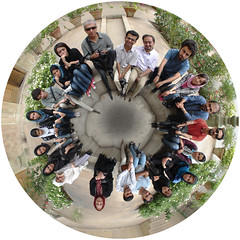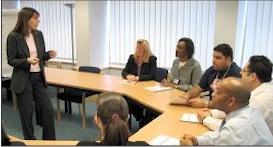 One of the things I often notice when I am facilitating strategic planning programs for my clients is the wide range of attitudes to change portrayed by different business leaders in the room.
One of the things I often notice when I am facilitating strategic planning programs for my clients is the wide range of attitudes to change portrayed by different business leaders in the room.
For some people the prospect of change is exciting and for others change is exhausting or even daunting.
It’s not unusual to find some participants with a gung-ho “any change is a good change” attitude literally facing off across the room against others with a more resistant “it’ll never work – anything but change” attitude.
And it’s true – change doesn’t always work!
But without change there is nothing. As a strategic planning facilitator, ensuring that the changes your organisation embarks on not only work but yield positive results, is fundamental for me.
Whatever the attitudes strategic planning participants display, it is inevitable that some changes will arise from any strategic planning program. So you can imagine I tend to spend quite a bit of time thinking about things like why change doesn’t always work.
Recently I joined Dean Holland’s Quick Start Challenge as part of my own continuing professional development and today I thought I might share with you some of Dean’s ideas about change and how to make it work. I think you will find they offer a helpful perspective on why change doesn’t always work and why I am always wary of both the gung-ho “any change is a good change” people and the “anything but change” people.
We all know that change is inevitable.
In fact, everything is constantly changing. Dean describes it as: “Change is automatic, like the weather.”
“However,” he goes on to say “PROGRESS is not automatic. We have to take control and take action to see real progress.”
And this, it seems to me, is what lies at the root of the problems for the “anything but change” people. When you feel like you have no control, or you adopt a passively resistant approach to change and implementing strategic planning outcomes, you will block progress even if you can’t delay change. And so of course in this situation, change doesn’t work.
But it’s also a problem for the “any change is a good change” people . Unless your proposed changes are aligned with well considered strategic objectives they will not yield real progress. In fact they will become another example of change that didn’t work…
To achieve positive results with organisational change requires a process that brings people on board with the changes willingly, that develops understanding as to why the changes are important, what the benefits will be and how they will be shared, and that creates clarity about exactly what actions will foster the changes and who will take those actions. Get this right and you will find change works!
So while change doesn’t always work, so long as your strategic planning process is well facilitated you can take control of the change process and be confident you will see real progress towards your desired results – and ultimately achieve true change that works!

 We all find it easy to avoid risks which are clearly visible, and everyone takes more care moving into uncharted territory. But when your old environment is changing slowly and subtly, you may need ‘new eyes’ to see the risks and opportunities.
We all find it easy to avoid risks which are clearly visible, and everyone takes more care moving into uncharted territory. But when your old environment is changing slowly and subtly, you may need ‘new eyes’ to see the risks and opportunities. When I work with organisations to develop their strategic plans it still surprises me how varied the goals and expectations of the team around the table can actually be.
When I work with organisations to develop their strategic plans it still surprises me how varied the goals and expectations of the team around the table can actually be.
 Once you are promoted to a group leadership role you will find yourself responsible for meeting or group facilitation as a regular part of your role.
Once you are promoted to a group leadership role you will find yourself responsible for meeting or group facilitation as a regular part of your role.





Effective Strategic Planning
The process of strategic planning is probably one of the most powerful tools available to an organisation, department or team. When a group work together to develop a plan they carry a strong commitment to implementing it away with them.
Yet too many people have had poor experiences with strategic planning sessions which fail to reach decisions, or where communication problems, dominant personalities and internal politics prevent constructive interaction.
There is a lot written about strategic planning, but much less on how to ensure your strategic planning session is effective.
What makes Strategic Planning Effective?
A successful and effective strategic planning session needs to:
Achieving all these outcomes, as well as generating a sound strategic plan, is more likely with independent, professional facilitation. A good strategic planning facilitator brings structure, an impartial perspective and useful expertise, experience and feedback.
Experience shows that when your strategic planning session is run by a team member the most likely outcome is a long staff meeting, with all the inherent dangers of entrenched positions, ‘group think’ and resistance to change.
An experienced facilitator who is expert in the strategic planning process can guide your group to a successful outcome by introducing new approaches and helping participants think creatively about problems, issues and opportunities.
By keeping discussions focused, on track and on time, and ensuring all voices are heard, key decisions are taken in a positive way, making sure your strategic planning is most effective.
Special Offer
If you are uncertain whether to use an external facilitator for your meeting, or you need to convince someone else to use one, have a look at our Free Fact Sheet ‘Why Use a Facilitator?’
(More ideas on how you can facilitate effective strategic planning in the Quick Tips below.)
Strategic Planning Facilitation Quick Tips
Involve your facilitator in designing your planning session. Their experience with many other groups offers valuable insight and new perspectives into what will be most effective in achieving your goals for the planning process.
A competent and experienced facilitator will have the flexibility, skills and ability to guide your group to its ultimate objective via a range of different paths. Encourage and empower your facilitator to modify planned activities in response to the group dynamic on the day.
Consider using an external strategic planning facilitator for other important meetings such as project debriefs, incident reviews, evaluations sessions, change implementation programs, employee forums, community or customer consultations and leadership programs.
…And Call us on 03-9859 3924 to discuss how we can help make your next strategic planning workshop your most effective yet!
Categories: Strategic planning - Tags: business strategic planning, business strategy consulting, effective marketing strategy planning sessions, effective meetings, effective plannin session, effective planning, effective planning days, effective planning in marketing, effective planning sessions, effective planning strategies, effective strategic meetings, effective strategic planning, effective strategic planning manual, effective strategic planning meetings, effective strategic planning session, Effective Strategic Planning Sessions, efficient strategic planning, facilitate a planning day, facilitate a strategic planning meeting, facilitate a strategic planning session, facilitate an effective strategic planning meeting, facilitate strategic planning meeting, facilitate strategic planning session, facilitates strategic planning sessions, Facilitating a Business Planning Session, facilitating a meeting to establish strategic direction, facilitating a one-day strategic planning session, facilitating a planning session, facilitating a startegic planning meeting, facilitating a strategic plan session, facilitating a strategic planning meeting, facilitating a strategic planning meetings, facilitating a strategic planning session, facilitating a strategy planning session, facilitating an it strategic planning session, facilitating effective strategic planning, facilitating planning, facilitating planning day, facilitating planning days, facilitating planning guide, facilitating planning session, facilitating planning sessions, facilitating strategic direction discussion, facilitating strategic planning meeting, facilitating strategic planning meetings, facilitating strategic planning session, facilitating strategic planning sessions, facilitating team planning, facilitating the planning meeting, facilitating visual strategic planning sessions, facilitation of strategic planning session, facilitation of strategic planning sessions, facilitation planning day, facilitation services, facilitator rates for strategic planning session, facilitator strategic planning session military, faciltating a strategic planning meeting, faciltating strategic planning, faciltating the strategic plan, format to facilitate a strategic planning session, group facilitation, group facilitator, guide Facilitation of a Strategic Meeting, guide to facilitating strategic planning, how can stragic planning be efficient, how long is an effective strategy meeting, How to conduct a strategic planning session, how to design an effective strategic planning session, how to do facilitate a strategic planning session, how to facilate a strategic plan session, how to faciliate a strategic planning session, how to facilitata a planning day, how to facilitate a business planning session, how to facilitate a church strategic planning meeting, how to facilitate a planning day, how to facilitate a strategic planning meeting, how to facilitate a strategic planning session, how to facilitate a strategy planning meeting, how to facilitate effective teambuilders, how to facilitate strategic meetings, how to facilitate strategic planing session, how to facilitate strategic planning, how to facilitate strategic planning session, how to manage an effective planning day, how to plan an effective visioning session, how to plan for a effective strategic planning session, how to run a stategic planning session, how to run a strategic planning session, how to run a stratgic planning session, how to run an effective strategic planning meeting, http://kmgconsulting com au/strategic-planning/effective-strategic-planning/, ideas for facilitating business planning sessions, ideas on how to facilitate strategic planning, leadership planning session, leadership planning sessions, meeting facilitation skills, planning a effective session, planning an effective strategy session, planning day facilitation, Planning Session Ideas, politics, professional facilitator, Resources for facilitating planning sessions, Running a Strategic planning session for Directors, running a strategic planning workshop, running a strategy session, running a team strategy session, selling a business strategic planning session, strategi marketing kmg, strategic business planning, strategic plan, Strategic Plan tips add comment, strategic planning, strategic planning day, strategic planning effectiveness, strategic planning facilitation, strategic planning meeting, strategic planning resources, STRATEGIC PLANNING SESSION, strategic planning session ideas, strategic planning sessions, Strategic planning team days what to cover, strategy and planning consulting, strategy planning session, structure to facilitate day planning meeting, successful strategic planning meetings, successful strategic planning session, team plaaning session, team planning session, techniques that makes strategic planning effective, template for and effective planning session, The Need for Effective Strategic Planning, tips for a successful strategic planning session?, tips for an effective strategic planning, tips for effective strategic planning, tips for facilitating meetings strategic planning, tips for facilitating planning meeting, tips for facilitating strategic planning, tips for strategic planning meetings, tips for strategic planning session, tips on facilitating scenario planning sessions, tips with strategic planning sessions, trends in strategic planning, what is effective strategic, what is effective strategic plnnning, What is effective Strategy planning, What makes consultancy planning effective?, What makes for an effective strategic plan, what makes up a successful strategic planning session, workshop facilitation tips